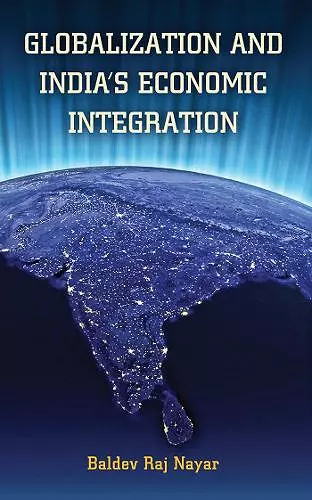Globalization and India's Economic Integration
Format:Hardback
Publisher:Georgetown University Press
Published:12th Nov '14
Currently unavailable, and unfortunately no date known when it will be back

Baldev Raj Nayar is among the most important analysts of economic change in India. The depth and breadth of his understanding of India's economic globalization is matched by the eloquence of his prose. Every student of Indian development and everyone interested in India's economic rise must read this book. -- Sanjaya Baru, director for geo-economics and strategy, International Institute for Strategic Studies Written by a world-class scholar of both globalization and India, this book conclusively puts to rest the popular critique that integration into the world economy leads to segmentation and disintegration of the national economy. Baldev Raj Nayar systematically and definitively shows how the economic reforms that opened India's economy to the global economy over the last three decades have also led to consolidation and integration within. Carefully researched and lucidly written, this is a must-read for the friends and foes of globalization alike. -- Arvind Panagariya, professor of economics and Jagdish Bhagwati Professor of Indian Political Economy, Columbia University
A common critique of globalization is that it causes economic segmentation and even disintegration of the national economy. While globalization has its benefits, such as higher economic growth, and costs, such as external shocks, the author's findings show that India has benefited from globalization more than it has been victimized by it.A common critique of globalization is that it causes economic segmentation and even disintegration of the national economy. Quite to the contrary, Baldev Raj Nayar provides a thorough empirical treatment of India's political economy that challenges this critique by demonstrating that, on balance, both state and market have functioned to attenuate such a disintegrative impact and to accentuate economic integration. The active role of the Indian state in the areas of economic planning, fiscal federalism, and tax reform has resulted in improved economic integration and not increased segmentation. Similarly, his investigation of trade, investment, entrepreneurship, and migration suggests tendencies inherent in the market in favor of economic integration, especially when assisted by the state. While globalization has its benefits, such as higher economic growth, and costs, such as external shocks, Nayar's findings show that India has benefited from globalization more than it has been victimized by it. Globalization and India's Economic Integration shows how globalization's pressures favoring efficiency paradoxically induced the state to push for consolidation on a pan-Indian scale in the area of fiscal federalism and to advance the cause of the common market through reforming the indirect tax system; meanwhile, the state has pressed forward with social inclusiveness as never before in its economic planning. For another, the market, too, has been instrumental, because of its widened scope and its inherently expanding character, in strengthening economic integration through trade expansion, diffusion of industry, and increased inter-state migration. Nayar's groundbreaking work will interest students, scholars, and specialists of India, South Asia, globalization, and political economy.
This book is an insightful addition to the scholarship on globalization and India. Political Science Quarterly
ISBN: 9781626161078
Dimensions: unknown
Weight: 590g
288 pages